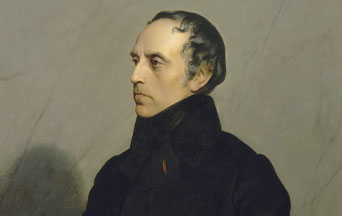
After the Chambers of Peers and Deputies voted to suppress the Society of Jesus in France in 1844, François Guizot, then Prime Minister, feared meeting with resistance. Therefore, he did not dare to apply the law immediately. Indeed, all Ultramontanes urged the Jesuits not to disperse and to try by all means to prevent the law’s enforcement.
While that was the wish of Ultramontanes, the government nevertheless achieved its goal of splitting Catholic forces. Henri Lacordaire continued living as if nothing were happening, as he was unable to defend or attack the Jesuits. The Compt de Coux, using his position as editor-in-chief of L’Univers, restricted the movements of Louis Veuillot. Veuillot, in turn, was one of the most ardent supporters of the resistance. The Archbishop of Paris used his authority to force the Jesuits to dissolve. For their part, Bishop Raffaele Fornari, the Apostolic Nuncio to France and Bishop Pierre Louis Parisis of Arras and the Order’s Superior General supported the Society of Jesus, using their efforts to protect its prestige by all means.
Seeing Catholic forces divided, Guizot conceived the project of obtaining the Society’s dissolution from the Sovereign Pontiff himself. Guizot sent Rossi to Rome as his negotiator. Rossi’s mission was one of the most intricate episodes in the history of the Church in France during the nineteenth century. An excellent diplomat, he used all his resources. He threatened, begged, negotiated, asked the French government for help, made all kinds of promises, and spared no threats.
The Archbishop of Paris wrote to Pope Gregory XVI asking for the dissolution. King Louis Philippe, who (according to the centuries-old custom of the kings of France) addressed the cardinals by calling them cousins, tried to use his influence in the Sacred College to get them to support his policies. At the same time, the King sought to intimidate the Apostolic Nuncio, threatening a religious persecution that no one would be able to stop. The government used all means at its disposal to facilitate Rossi’s mission.
 Learn All About the Prophecies of Our Lady of Good Success About Our Times
Learn All About the Prophecies of Our Lady of Good Success About Our Times
What happened in Rome is a mystery. Pope Gregory XVI referred the matter to the Congregation for Extraordinary Ecclesiastical Affairs. The Congregation unanimously rejected France’s request. Rossi withdrew his bid to the Holy See and went to Luigi Cardinal Lambruschini, Secretary of State. Rossi told the Cardinal that the French government was not an enemy of the Jesuits, nor did the government wish them harm. However, it found itself greatly embarrassed because the law had been approved. Thus, the government would be content with being able to declare, as the Chambers reopened, that some of the better-known Jesuit houses in France would be less prominent and that the Order would transfer some priests to lesser places.
Rossi’s arguments seemingly led Cardinal Lambruschini to reconsider the matter. The Cardinal left the decision to Fr. Jan Roothaan, the Jesuit Superior General. He had earlier called for resistance. Now he suddenly changed his attitude and closed the Society in France. No one knows exactly what happened. Most likely, the Secretary of State pressured the Superior General to make this decision.
Rossi boasted of his mission’s complete success. Moniteur, the French government’s official newspaper, published this note: “The King’s government has received news from Rome. Rossi’s negotiation has attained its goal. The Society of Jesuits will cease to exist in France and disperse on its own; its houses will be closed, and its novitiates dissolved.”
The Ultramontanes’ defeat was complete. Veuillot, Montalembert, and Bishop Parisis were desolate. The Society’s Superior General sent them letters and emissaries, urging them to conform to the decision, saying it was the best solution. Bishop Parisis and Veuillot did not press the matter any further. However, the Compt de Montalembert could not keep silent when he lost a match. In a letter to the Jesuit Father Gustave de Ravignan, he proclaimed himself a standard-bearer of Catholic liberalism, to which he would soon surrender completely.

